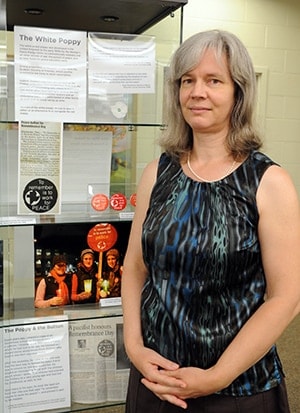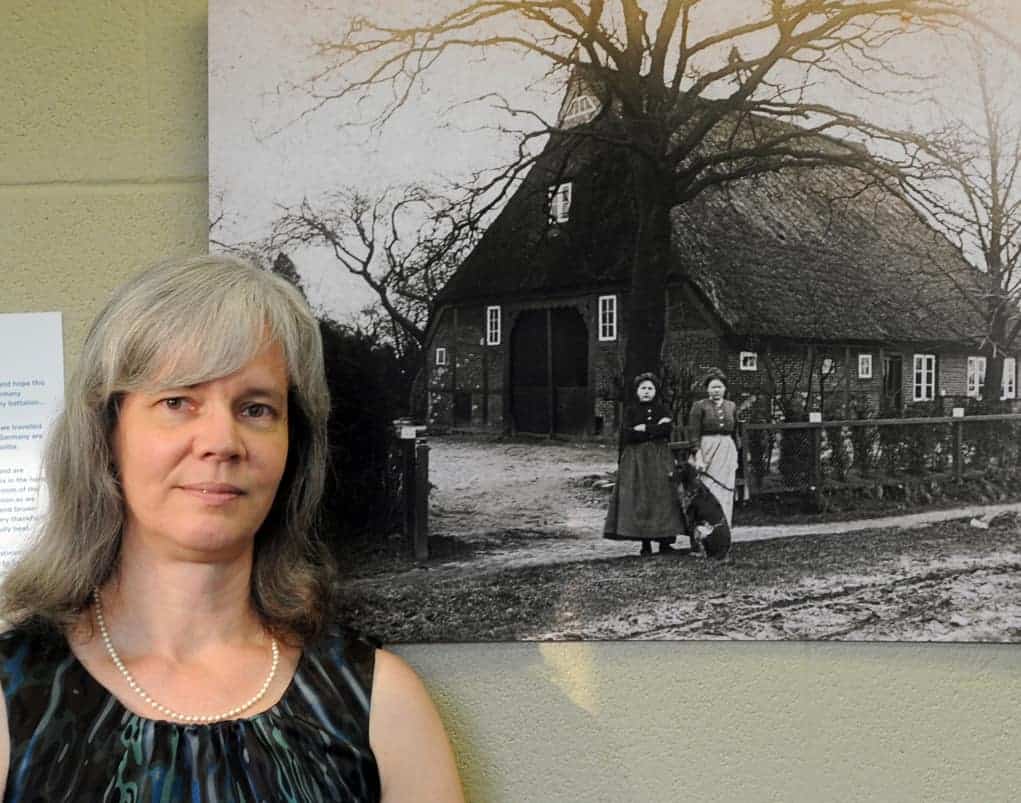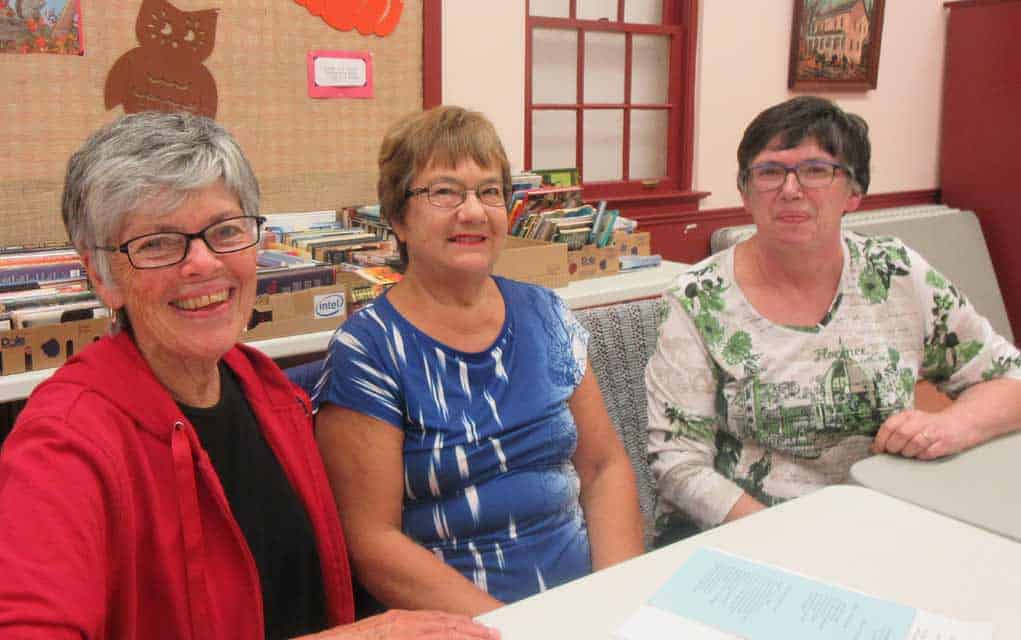In remembrance of the sacrifices made and struggles wrought during the First World War, the Mennonite Archives at Conrad Grebel University College is displaying exhibits both international in their scope and distinctly local.
From September 25 until Remembrance Day, November 11, the archives are devoting an exhibit specifically to the experiences of the Mennonite communities during the Great War a century ago. Titled “The Sites of Non Resistance: Ontario Mennonites and the First World War,” the exhibit aims to tell the stories of men and women of the province’s pacifist communities, as they grappled with the social and political climate of the time.
“For the first few years of the war, I think Mennonites just generally tried to stay out of it. They had this long tradition of pacifism, and they wanted to maintain that,” explains Laureen Harder-Gissing, archivist-librarian at the Mennonite Archives and creator of the exhibit.
However, as the war wore on in Europe and the battle lines remained obstinately in place, the Mennonite’s status of conscientious objector, which exempted them from service, became far more contentious.
By 1917, volunteer enlistments for the war had dwindled amongst the exhausted Canadian populace. Appeals by Canadian politicians to British and imperial solidarity were yielding diminishing returns, even as the war showed no signs of abating. Determined to reinforce the Canadian forces on the battlefront, then-prime minister Robert Borden made the difficult choice to enact conscription. Preceding that, Borden passed the Wartime Elections Act, which stripped conscientious objectors and newly immigrated Canadians of the vote, while enfranchising the wives, sisters and daughters of soldiers who would, conceivably, support conscription.
“Mennonites needed to kind of swing into action and advocate to government to make sure they still had their conscientious objector status. So some of them travelled to Ottawa in order to speak with government in order to do that,” says Harder-Gissing.
“But also ordinary Mennonites, starting during this time of conscription especially, really found it a challenge to think about their peace position in light of the fact that their neighbours were being sent off to war. There was just so much more questioning of, ‘Why are young men on the street? Why are they not in uniform?’”
Harder-Gissing says she was motivated to tell the public about the often overlooked Mennonite community, which in 1921 numbered about 13,000 in Ontario, and 60,000 across Canada. This would have included both Old-Order Mennonites and the “assimilated” denominations, who would have shared in their pacifist ideology.
“What I’ve tried to do is dig through the archives and find stories of individual Mennonites, both men and women, who had experiences during the war where they had to confront some of these difficult things, and just have them tell their stories in their own words as much as possible,” says Harder-Gissing.
“So we have 12 different stories and each of them associates with a specific location, and that’s why we call it ‘Sites of Nonresistance.’”
The experiences of Mennonites during the war varied considerably, says Harder-Gissing, from inner-struggles with church doctrine and belief to difficulties with the wider Canadian society.
“There was a couple farm boys in East Zorra(-Tavistok) Township working out in the fields, for example. And they were taken by military police and put in the military camp in London, Ontario, and basically held for six weeks where they tried to persuade them to enlist. (The farm boys) held out for that time and they were finally released,” she notes.
Other instances saw Mennonite men conscripted through “overzealous recruiting” as well, by officials not always aware of their exemption from service, and the churches had to argue for these men’s release and return to civilian life. In the end, Harder-Gissing says she is not aware of any Mennonites who were conscripted and forcibly sent to the front, though there were some Mennonites who did volunteer for the war effort, and often left the church because of it.

“So there’s these stories of these young men. There’s also women who were seeing women around them, non-Mennonites, being involved in providing knitting for soldiers and that kind of thing, or becoming nurses in the military,” says Harder-Gissing.
“And they wanted to respond and aid in suffering, but they wanted to do it from a pacifist perspective. So there were a lot of women’s sewing groups formed to sew, but for the relief of civilian suffering, not military suffering.”
Harder-Gissing says she hopes her exhibit will help demonstrate the enormous social impact the war had on Canadian communities through the experiences of these 12 Mennonites.
“I think by telling the stories of individuals who wrestled with their consciences, it reminds us that there was not just one story of the First World War where all the young men went off to war, and all the women stayed home and they contributed to the war effort.” Rather, there were tremendous changes going on across all sectors of the Canadian population.
“The French Canadians were very opposed to conscription. Many new Canadians, so many Canadians of non-British origin, had some ambivalent feelings about the war, and we know here in Kitchener – which was formerly Berlin – that actually resulted in that name change happening. So when you dig deeper into these stories, there’s a lot more going on than we realize, and the more understand about what that conflict did to Canadian society I think it really helps to explain and helps us to understand who we are as a country.”
While the Sites of Nonresistance exhibit is running, the archives will also be taking part in The World Remembers Project, an exhibit being run in 60 locations around the world that attempts to name all of the 661,818 soldiers and nurses killed on both sides of the conflict. The exhibit project all 661,818 names over the course of 48 days, in an effort to remember every individual lost in the conflict. A database of every name and the exact time their name will be displayed in the exhibit can be found at www.theworldremembers.org.
The Mennonite Archives is located at the Conrad Grebel University College, at 140 Westmount Rd. N., Waterloo. The exhibits will be available for viewing Monday to Saturday during regular library hours.









